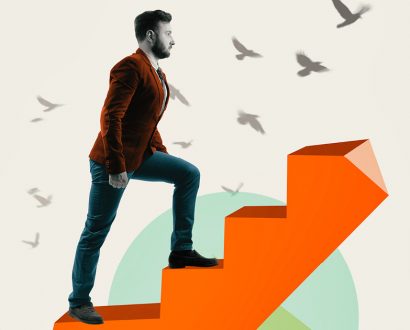All around the world, a powerful truth hangs heavily over every move we make: the future belongs to the youth. It’s an inescapable certainty that holds both promise and immense responsibility. But for Africa, it holds yet greater poignancy.
Africa is one of the world’s most populous continents and is growing fast. With more than 60 percent of its over 1.3 billion people under the age of 25, tech-fueled disruption is flourishing. Here, as innovation, resilience and a burning desire for a brighter tomorrow collide, a vibrant startup ecosystem is powering the continent’s economic evolution, with accelerators and incubators playing a vital role.
Even as the continent’s startup sector feels the squeeze of the global capital crunch, these programs are equipping a new generation of entrepreneurs.
Over the course of 2022, a record 633 African tech startups raised a combined US$3.3billion, according to Disrupt Africa’s African Tech Startups Funding Report. That same year, more than 50 percent of funded African tech startups took part in some form of accelerator or incubation program prior to raising, or as part of their raise. This was a substantial increase on the previous year, when that number stood at less than 38 percent.
Even as the continent’s startup sector feels the squeeze of the global capital crunch, these programs are equipping a new generation of entrepreneurs with the essential tools to overcome obstacles and transform groundbreaking ideas into tangible realities.
Bright sparks
According to researchers, there were 61 incubator and accelerator programs operating across Africa in 2021. While programs such as Y Combinator and Founder Institute have had a local presence for some time, newcomers are stirring up the scene, forging smart collaborations with some of the world’s biggest multinationals as well as homegrown success stories.
It’s clear that companies around the globe are keenly eyeing the African opportunity.
“Microsoft believes that African startups and small and medium-sized enterprises (SMEs) are well-positioned to become a bedrock for the African digital economy, with relevant solutions to local societal and economic challenges,” says Mame-Fatou Guey, Microsoft Africa Transformation Office SME Program Manager, when discussing the FAST Accelerator program with Disrupt Africa in September.

“Our objective is to empower startups and underrepresented entrepreneurs to rapidly and sustainably scale their businesses and create new job opportunities using AI as a catalyst.” – Dave Ojika
The IT giant has partnered with Flapmax to “strengthen and scale Africa’s digital ecosystem”. Flapmax, founded in 2018, is in the second year of its FAST Accelerator program which includes a two-week online bootcamp, attended by more than 60 tech companies from 35 countries in Africa. From this cohort, 12 carefully selected startups went on to take part in a five-week comprehensive acceleration experience in Silicon Valley, California.
“At Flapmax, our mission is to build societally impactful solutions that harness the power of AI to transform multiple industries through long-term partnerships with startups, SMEs and global enterprises,” Flapmax Founder and CEO Dave Ojika told Disrupt Africa.
“Collaborating with technology partners like Microsoft and Intel, we are assembling a unique fusion of cutting-edge AI technologies, business development strategies and global-scale growth opportunities for Africa and other emerging markets. Our objective is to empower startups and underrepresented entrepreneurs to rapidly and sustainably scale their businesses and create new job opportunities using AI as a catalyst.”
African flavor
Adanian Labs is another relative newcomer to the scene, and is already making its mark. Founded in 2020 with the aim of bringing an “African perspective” to the space, it aims to build 300 “impact-driven, commercially viable” tech companies in Africa by 2025, specializing in blockchain and AI technologies.
“We understand that, in Africa, lots of startups do not have a lot of access to most of the things that make startups succeed,” Nigeria Country Manager Killian Mayua tells The CEO Magazine. “As such, we came up with ways and tactics to do a lot with the very little that we have.”
“We understand that, in Africa, lots of startups do not have a lot of access to most of the things that make startups succeed.” – Killian Mayua
The organization is also involved in the Power Learn Project, which is upskilling the continent’s youth with the tools to drive positive change, with the target of 1 million graduates by 2027. “The AI market is going to explode,” Mayua says. “If we miss this opportunity, it’s going to be like missing the dot-com window.”
While Adanian now operates in six African markets, its recent strategic partnership with MTN-founded Ayoba focuses on driving the growth of small businesses in Nigeria with scope to expand to other countries.
The SME Accelerator aims to address the key obstacles facing SMEs, such as limited access to capital, technology infrastructure, market access and mentorship, while simultaneously driving innovation, competitiveness, growth and sustainable employment opportunities.
Joint benefits
It also gives businesses access to the features of Ayoba’s all-in-one app – which incorporates messaging, hyperlocal content, gaming, music and ecommerce – along with its fast-growing audience. This year, it surpassed 30 million monthly users, a figure that highlights its growing clout and makes it the perfect platform for developing entrepreneurs, according to Head of Ecosystem Development Shiela Yabo.
“We expect that when they finish that program, they are building viable businesses,” she explains. Most of the de-risking has been done for these businesses to be able to succeed. For us, we see investing earlier on in entrepreneurs, whether it’s an SME or a startup, as the way to go. The return on investment lies where we are building a healthy public pipeline for us in the future.”

“You cannot copy what is done in the western world and paste it into an African context.” – Shiela Yabo
Yabo describes her work at Ayoba as “corporate innovation”, bringing ideas to scale. “It sounds weird to say corporate in a startup, but that’s the framework that we are using – looking at how do we nurture and develop these early ideas or maturing businesses and make sure that they are well equipped,” she says.
“What I think is also happening now is that we are taking ownership of what technology and innovation means through an African lens, controlling the narrative and what technology means in Africa and having African people run businesses for other African people. You cannot copy what is done in the western world and paste it into an African context.
“Africa, it’s not a country. There are so many cultural nuances.”
Early start
For Futurize, a London-based entrepreneurship platform founded by Rhea Singhla during the COVID-19 pandemic, it is important to focus at the early stages of the career and startup journey to deliver the most impact.
“Africa has the youngest population in the world. But even if they graduate with computer science degrees or the degrees that are in demand, they’re not able to find a job,” Singhla says. “So what’s the next solution? You need to innovate and you need to be able to start your own business, but how do you do that if no-one trains you how to do it?”
“Africa has the youngest population in the world. But even if they graduate with computer science degrees or the degrees that are in demand, they’re not able to find a job.” – Rhea Singhla
Futurize recently expanded its offering beyond its Field Africa entrepreneurship camps, with the launch of FuturizeU, a partnership with pharmaceutical firm AstraZeneca to deliver healthcare solutions to the challenges of non-communicable diseases and access to health care. Around 1,300 students from 18 universities across nine countries take part in the program each year.
“It’s a little bit different working with the younger generation compared to people who might have a little bit more industry experience,” Singhla says.
But by working closely with the universities, Futurize can offer the necessary support on a long-term basis. “Not only will they support us on these programs providing us with the talent and capabilities to access some of their resources, but we are also embedded into their ecosystems as well, helping them with their workshops or their entrepreneurship centers.”
With programs that focus on each stage of the entrepreneurship journey, this growing community of collaboration and innovation that is springing up across the continent is unlocking Africa’s untapped potential. By nurturing this spirit of innovation, these incubators and accelerators are ensuring that, if Africa’s youth is its future, then great things are on the horizon.







